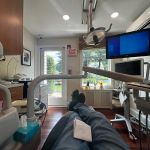Dental Care Tips for People with Braces
- Why Braces Care Is Important
- Brushing and Flossing with Braces
- Foods to Avoid with Braces
- Dealing with Braces Pain
- How to Clean Braces Effectively
- Consulting Your Dentist About Braces
1. Why Braces Care Is Important
If you or your child is wearing braces, you’re probably aware that proper dental care becomes even more important during this time. Braces work by gradually moving your teeth into their ideal positions, but for them to be effective, you need to take extra care of your oral hygiene. I’ve personally experienced the journey of wearing braces and have learned the hard way how critical it is to follow a thorough dental care routine.
Braces, with their wires and brackets, can trap food particles and plaque, making your teeth more vulnerable to cavities and gum disease if not cleaned properly. It’s easy to overlook this extra effort when you’re focused on adjusting to your new lifestyle with braces, but trust me, staying on top of your oral hygiene can make a world of difference in the effectiveness of your treatment and your overall dental health.
2. Brushing and Flossing with Braces
When I first got my braces, brushing my teeth felt like a bigger challenge than ever. The wires and brackets made it harder to get the toothbrush into all the nooks and crannies, but with a little patience and the right technique, brushing and flossing with braces becomes second nature.
Brushing
To ensure your teeth stay clean and healthy, it’s important to brush after every meal. I quickly learned that using a soft-bristled toothbrush with a slightly angled head helped me clean around the brackets and wires more effectively. I would also recommend using fluoride toothpaste to help prevent cavities. Make sure to brush at a 45-degree angle to the gum line and carefully clean along the brackets and between your teeth.
Flossing
Flossing with braces is often the biggest hurdle for people with braces, but it’s essential for keeping your gums healthy. I used a floss threader, which is a simple tool that helps you get the floss under the wire of your braces and between your teeth. Some people opt for orthodontic floss, which is a bit thicker and more rigid. Regular flossing removes plaque and food particles that brushing might miss, and it helps prevent gum disease.
3. Foods to Avoid with Braces
One of the most important lessons I learned while having braces is that certain foods can damage them or make cleaning your teeth more difficult. Avoiding certain foods will not only protect your braces but also help you maintain the cleanliness of your teeth. Here’s a list of foods to steer clear of:
Sticky Foods
Sticky foods like caramel, taffy, or chewing gum can get stuck in your braces and are hard to remove. During my time in braces, I learned that chewy, sticky foods increase the likelihood of plaque buildup and can even cause the brackets to loosen. Avoiding them helps ensure that your braces stay intact and your teeth stay clean.
Hard Foods
Foods like nuts, popcorn, or hard candy can damage the wires and brackets of your braces. I recall the time I bit into a hard pretzel, only to hear a snap. It was painful, and my orthodontist had to fix the wire. To avoid issues like this, it’s best to cut up hard foods into smaller, bite-sized pieces and chew carefully. This simple adjustment can prevent potential damage to your braces and avoid unnecessary trips to the orthodontist.
Acidic Foods
Acidic foods, such as citrus fruits or vinegar, can erode the enamel on your teeth, making them more susceptible to cavities. While you don’t need to eliminate them entirely, it’s a good idea to limit your consumption and rinse your mouth with water afterward to protect your teeth. I always found that having a glass of water nearby helped wash away any residue after eating acidic foods.
4. Dealing with Braces Pain
After getting my braces, the first few days were tough as my teeth and gums adjusted to the pressure. Braces are designed to gradually move your teeth into place, but sometimes this can cause discomfort or pain. However, there are ways to manage the discomfort.
Orthodontic Wax
One of the most helpful things I discovered was orthodontic wax. This small, soft wax can be applied over any part of your braces that’s causing irritation to the inside of your lips or cheeks. It provides a protective barrier, helping you avoid painful sores. I kept a small container of wax with me at all times, as it was a lifesaver during the first few weeks of wearing braces.
Pain Relief
Over-the-counter pain relief, like ibuprofen or acetaminophen, can help alleviate discomfort. I found that taking a pain reliever right after an adjustment appointment helped me get through the day without much pain. Always check with your orthodontist before taking any medication, though, to ensure it’s safe for your specific situation.
5. How to Clean Braces Effectively
Cleaning your braces properly is essential for maintaining your oral health. When I first got my braces, I was overwhelmed by the extra steps involved in keeping them clean. However, with a few simple tools, I quickly learned how to clean my braces effectively.
Use an Interdental Brush
One tool that made a big difference in cleaning my braces was an interdental brush. This small brush has a narrow head, which allows you to clean between the wires and brackets. It’s much more effective than traditional toothbrushes for getting into hard-to-reach spots. I found that using this tool after each meal helped keep my braces clean and free of debris.
Rinse with Mouthwash
Rinsing with a fluoride mouthwash is a great way to ensure your braces stay clean and your mouth stays fresh. I used a mouthwash that not only killed bacteria but also helped strengthen my enamel, which was vital for keeping my teeth healthy during the entire braces process.
6. Consulting Your Dentist About Braces
Throughout my braces journey, I always made sure to keep in regular contact with my orthodontist. They provided invaluable tips on maintaining my braces, as well as strategies for preventing issues like plaque buildup or gingivitis. Regular check-ups are crucial for monitoring your progress, and your dentist can also help address any concerns you might have about your treatment.
If you’re looking for a trusted dental practice to help guide you through the process of caring for your braces, I highly recommend Dentistry Toothtruth. Their team offers expert advice and high-quality dental care to make sure you get the most out of your orthodontic treatment.







 Smile Center4.0 (297 review)
Smile Center4.0 (297 review) Smile L.A. Downtown Modern Dentistry4.0 (484 review)
Smile L.A. Downtown Modern Dentistry4.0 (484 review) Hurley and Volk Orthodontics - South Elgin4.0 (410 review)
Hurley and Volk Orthodontics - South Elgin4.0 (410 review) HealthPartners Dental Clinic Woodbury2.0 (24 review)
HealthPartners Dental Clinic Woodbury2.0 (24 review) Pediatric Dental Associates of Randolph4.0 (1772 review)
Pediatric Dental Associates of Randolph4.0 (1772 review) Anthony Brucci5.0 (2 review)
Anthony Brucci5.0 (2 review) The Importance of Oral Health Education During Pregnancy for a Healthy Pregnancy
The Importance of Oral Health Education During Pregnancy for a Healthy Pregnancy Best Tips for Brushing Your Teeth Properly for Healthy Gums: Essential Techniques for Oral Health
Best Tips for Brushing Your Teeth Properly for Healthy Gums: Essential Techniques for Oral Health Why Skipping Dental Checkups Can Lead to Bigger Oral Health Problems
Why Skipping Dental Checkups Can Lead to Bigger Oral Health Problems Advantages of Porcelain Dental Restorations
Advantages of Porcelain Dental Restorations How Can Diabetes Cause Tooth and Gum Problems? Preventing and Managing Oral Health Issues
How Can Diabetes Cause Tooth and Gum Problems? Preventing and Managing Oral Health Issues Healthy Habits for Promoting Good Oral Health and Hygiene: Tips for a Healthy Smile
Healthy Habits for Promoting Good Oral Health and Hygiene: Tips for a Healthy Smile